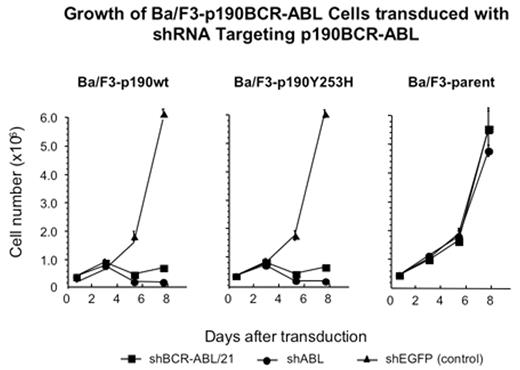Abstract
In the majority of Philadelphia chromosome (Ph)-positive acute lymphoblastic leukemia (Ph-ALL) cases, the resulting BCR-ABL gene generates 190 kD active tyrosine kinase (p190) which is responsible for leukemogenesis and can be a molecular target for therapy. Although a series of ABL kinase inhibitors including imatinib, nilotinib and dasatinib reveal potent activities against Ph-ALL, acquired resistance caused by point mutations in the kinase domain such as T315I still remains to be overcome. That is why a novel strategy is desired in the treatment of Ph-ALL. We previously reported that lentiviral delivery of maxizyme targeting p190 specifically induced apoptosis of Ph-ALL cells (Blood 104:356, 2004). Since RNA interference proved to be a more powerful tool in selective gene silencing, we applied this technology to test whether specific and efficient killing of Ph-ALL cells could be achieved by down-regulation of p190. We designed a series of 21-mer and 27-mer small hairpin RNA (shRNA) targeting p190 mRNA and constructed plasmid vectors expressing these shRNA, which were screened by transfection of 293T/p190 cells to determine optimal target sites. As a result, three candidate sequences were identified; junctional 27-mer, junctional 21-mer and ABL 21-mer. Then, we inserted each of the shRNA expression cassettes into the lentiviral vector (HIV-U6/shRNA) and prepared high titer virus stock for infection of leukemia cells. shBCR-ABL/21, but not shBCR-ABL/27, induced significant and specific cell death of p190+ Ph-ALL cells in a time-dependent manner. shABL was more potent than shBCR-ABL/21 and also active against p210+ CML cells as well as 293 cells, but did not substantially affect Ph-negative leukemia cells. Both shABL and shBCR-ABL/21 completely inhibited growth of Ba/F3 cells harboring either wild-type or mutant p190 which renders those resistant to imatinib. Furthermore, both shRNA at low multiplicity of infection additively cooperated with imatinib in growth inhibition of Ba/F3-p190 cells. These data suggest that shRNA targeting p190 may become a therapeutic option in Ph-ALL by improvement of its delivery system like liposome.
Growth of BA/F3-p190BCR-ABL Cells transduced with shRNA Targeting p190BCR-ABL
Growth of BA/F3-p190BCR-ABL Cells transduced with shRNA Targeting p190BCR-ABL
Disclosure: No relevant conflicts of interest to declare.
Author notes
Corresponding author


This feature is available to Subscribers Only
Sign In or Create an Account Close Modal